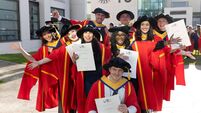Fr Liam Power: A tribute to the late Éibhear Walshe

The late Éibhear Walshe
I had the great privilege of celebrating the funeral Mass for the late Eibhear Walshe on Friday, August 2.
Eibhear had died suddenly a few days earlier, on July 27, at the relatively young age of 62.
Eibhear is survived by his beloved mother Celine who resides in Summerville Avenue, brothers Eoin and Sheamus, sisters Ria and Oonagh, nieces, nephews.
A native of Waterford, he was Director of the Creative Writing Department and Senior Lecturer in English at UCC and was a prolific author and noted academic. His works were highly acclaimed in literary circles, not only in Ireland but throughout the English-speaking world. I sincerely hope that he will be honoured in his native city for his brilliant academic and literary achievements.
Eibhear has published in the area of memoir, literary criticism and biography; his books include Kate O’Brien: A Writing Life, Oscar’s Shadow: Wilde and Ireland, and A Different Story: The Writings of Colm Tóibín.
His childhood memoir, Cissie’s Abattoir, was broadcast on RTÉ’s Book on One. He explores themes of identity, heritage, and the human experience through a distinctly Irish lens.
I first met Eibhear just over two months ago. He and I participated in a group on Zoom, assembled to discuss an article pertaining to research for a PhD thesis on St Francis. Because of GDPR etc, we were not introduced to one another.
I had no idea who Eibhear was but I was fascinated by the insights he shared with the group. So I googled him after the second meeting.
You can only imagine my amazement when I discovered his erudition, his literary output, his contribution to scholarship and to the arts in Ireland.
He was so modest, so self-effacing, so warm and made me feel that my contribution was appreciated.
I felt encouraged to continue with the group not feeling the slightest bit intimidated or overawed by his brilliance and academic standing.
All his former students and colleagues in the Creative Writing Department in UCC would have the same to say about Eibhear. They posted beautiful tributes to a truly gifted soul.
I record a flavour of the many accolades posted: “A truly inspirational lecturer”, “ a kind, friendly and generous man, always approachable, and he shared his wisdom and knowledge in a very giving, open and accessible manner… his classes were a pleasure to attend and we learned so much from him… he was an incredibly kind and patient source of inspiration...”
He was always encouraging of others to develop their gifts. Eibhear was a unique combination of academic brilliance, personal warmth, kindness, and with a wonderful capacity for friendship.
He inspired generations of students not only at UCC but also enjoyed international acclaim for his work in universities in Buenos Aires and Sao Paulo in Brazil.
I have only just begun to explore Eibhear’s work. I was fascinated by his approach to one particular theme: his exploration of spirituality in literature and literary themes.
He consistently argues for the significant role of spirituality in literature. He believed that literature serves as a vehicle for exploring the spiritual quest, offering insights into the human condition and our connection to the divine.
In his novels and critical writings, he often incorporates themes of spirituality and moral questioning, portraying how individuals navigate their faith in the face of personal and societal challenges.
He wrote a critical analysis of the works of Irish authors Kate O’Brien and Colm Tóibín. Eibhear explores how their narratives intertwine with themes of Catholicism, personal belief, and the search for meaning.
He highlights the ways in which these authors reflect on the collapse of traditional religious beliefs and the emergence of new spiritual understanding.
Tóibín, in particular, expresses deep sadness at the loss of traditional rituals, devotions and worship that shaped his upbringing. Walshe articulates a profound awareness of the need to satisfy the deep spiritual hungers of the human heart.
With the decline of institutional religion, many people, particularly the younger generation, are struggling to find meaning and purpose. Eibhear was conscious of this spiritual crisis in our society and of the urgent need to address it.
His own spirituality was evident in his advocacy work for the marginalised, such as the LGBTQ Community. He has been a significant voice in addressing LGBTQ issues in Ireland through his scholarly work and literary contributions, exploring the historical invisibility and marginalisation of gay individuals in Ireland.
Eibhear has also been involved in discussing and advocating for LGBTQ rights in a broader social and political context in our country.
To have made such a lasting impression on so many students; be so admired by so many colleagues and so highly thought of both at home and abroad, is surely testament to a very special, talented, inspiring, thoughtful and kind person. May he rest in peace.






